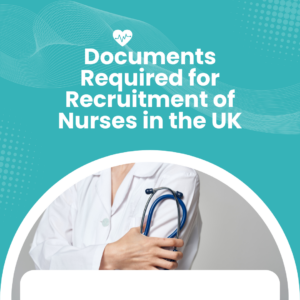Choosing a career in nursing is a significant decision, and one of the most critical factors in your choice will be where you decide to practice. For many nurses worldwide, the UK stands out as an ideal destination. In this blog, we will explore why you choose the UK for a nursing job, offering insights into the numerous benefits, opportunities, and overall appeal of pursuing a nursing career in this diverse and dynamic country.
High Demand for Nurses in the UK
One of the main reasons why you choose the UK for nursing job opportunities is the growing demand for healthcare professionals. The UK has a well-established healthcare system, the National Health Service (NHS), which is renowned globally for its high standards of care. However, with an ageing population and increasing healthcare needs, there is a constant demand for skilled nurses.
The UK government has prioritized recruiting nurses from both domestic and international sources to meet this demand. For aspiring nurses, this translates to numerous job opportunities, job security, and a strong likelihood of career advancement.

Why You Choose UK for Nursing Job
Competitive Salary and Benefits
Another compelling reason why you choose the UK for nursing job roles is the competitive salary and attractive benefits package. Nurses in the UK are well-compensated for their work. The NHS provides standardized pay scales, which means that you can expect fair remuneration based on your experience, skills, and position.
In addition to a competitive salary, nurses in the UK often receive generous pension contributions, paid holidays, and sick leave. The NHS also offers a variety of financial incentives, including bonuses for working in specific high-demand regions or specialities. These perks make the UK an appealing destination for nurses looking to build a stable and rewarding career.
Global Recognition of UK Nursing Qualifications
The UK’s nursing education and qualifications are recognized and respected worldwide. This is another reason why you chose the UK for nursing job prospects. Training in the UK ensures that you receive high-quality education, enabling you to practice nursing not only in the UK but also in many other countries.
Nurses who have trained and worked in the UK are often seen as having top-tier qualifications and experience. This recognition can open doors to international opportunities and provide a sense of prestige in your nursing career.

Opportunities for Career Development and Specialization
When considering why you choose the UK for nursing job options, career development is a key factor. The UK offers extensive opportunities for nurses to specialize in a wide range of fields. Whether you are interested in critical care, paediatrics, mental health, or gerontology, there are numerous avenues for specialization.
The UK healthcare system supports continuous professional development (CPD), with many courses, workshops, and seminars available for nurses to enhance their skills. This means that you will have access to resources that help you grow and evolve in your career. Specializing in a particular area can also lead to higher pay and increased job satisfaction.
Work-Life Balance and Flexible Working Hours
A crucial aspect of why you choose the UK for nursing job satisfaction is the emphasis on work-life balance. The UK healthcare system understands the importance of maintaining a healthy work-life balance, and many nursing roles offer flexible working hours.
You can often choose from a variety of shift patterns, including part-time, full-time, or flexible working schedules. This flexibility allows nurses to maintain a balance between their professional and personal lives, ensuring long-term career sustainability without burnout.
Multicultural Environment
The UK is known for its rich cultural diversity, and this is particularly evident in its healthcare workforce. When considering why you choose the UK for nursing job prospects, the opportunity to work in a multicultural environment is a significant advantage. You will work alongside professionals from diverse backgrounds, gaining valuable experience and broadening your perspectives.
This cultural exchange enhances communication skills and creates an inclusive working environment where ideas and practices from different cultures are valued. Additionally, the UK is welcoming to foreign-trained nurses, offering support systems to help them integrate into the workforce.
Access to Advanced Medical Technologies and Facilities
The UK is at the forefront of medical innovation and technology. Another reason why you choose the UK for nursing job opportunities is the access to advanced medical technologies and state-of-the-art healthcare facilities. The NHS and private healthcare providers in the UK invest heavily in modern equipment and cutting-edge medical techniques.
As a nurse in the UK, you will be exposed to some of the latest advancements in healthcare, allowing you to enhance your clinical skills and provide the best possible care to patients. Working with modern technologies also boosts your confidence and helps you stay updated with global trends in nursing.
Pathway to Permanent Residency and Citizenship
For international nurses, the question of long-term residency is often an important consideration. Another significant reason why you choose the UK for nursing job roles is the potential pathway to permanent residency and, eventually, British citizenship.
The UK offers a clear immigration pathway for healthcare workers, including nurses. After working for a specified number of years in the UK, you can apply for permanent residency. This provides a sense of stability and security, making the UK a desirable destination for nurses looking for long-term opportunities abroad.
Extensive Support for International Nurses
If you are wondering why you chose the UK for nursing job opportunities, highlight the extensive support available for international nurses. The UK has established programs to help foreign-trained nurses integrate smoothly into the UK healthcare system.
International nurses are supported through orientation, training, and guidance on adapting to local healthcare practices. Additionally, employers often offer relocation assistance, helping with visa applications, accommodation, and settling into a new environment.
Opportunity to Make a Difference
Nursing is a deeply rewarding profession, and the UK provides an excellent platform for nurses to make a tangible difference in the lives of patients. One of the core reasons why you choose the UK for nursing job roles is the opportunity to work in an environment where you can truly impact the well-being of individuals and communities.
The UK’s healthcare system focuses on patient-centred care, giving nurses the opportunity to be at the forefront of improving patient outcomes and overall healthcare quality.
Cultural Attractions and Quality of Life in the UK
In addition to the professional benefits, another reason to choose the UK for nursing job opportunities is the high quality of life the country offers. The UK is home to world-renowned cultural attractions, historical landmarks, and beautiful landscapes.
Whether you enjoy visiting museums, exploring scenic countryside, or experiencing vibrant city life, the UK has something to offer everyone. Nurses working in the UK can enjoy a rich cultural experience while benefiting from the country’s excellent infrastructure, public services, and healthcare.
Financial Assistance for Further Education
Nurses in the UK who wish to pursue further education or advanced degrees often have access to financial assistance and scholarships. The NHS and other organizations frequently provide funding for nurses to complete postgraduate studies, such as a master’s degree or master’s training.
This is a key reason why you choose the UK for nursing job roles, as it allows you to continue your education without the burden of significant financial costs. Further education also enhances your career prospects and opens up additional opportunities for advancement.
Conclusion
In conclusion, the UK stands out as one of the top destinations for nurses due to the vast array of benefits it offers. Whether it is the high demand for nursing professionals, competitive salary packages, access to advanced medical technologies, or opportunities for career development, the reasons why you choose the UK for nursing job roles are clear and compelling.
The multicultural environment, supportive programs for international nurses, and pathways to permanent residency further appeal to the UK as an excellent choice for building a nursing career. With so many opportunities and advantages, it is no wonder that the UK continues to attract nurses from around the world who are eager to make a meaningful impact in the field of healthcare.
By choosing the UK, you are not only investing in your career but also embracing the chance to grow both professionally and personally in one of the world’s most respected healthcare systems.






